Beyond George
The ever important element to my life was and has always been the constant moving forward in my craft. I read all that I could and went to where I needed to go to learn more. There was no world wide web and all mail was delivered by had through a letterbox. The library was restricted but there were specialist book clubs that sent out catalogs every month for you to choose from. Events of consequence were haphazard but things did get more organised with groups forming based on like mindedness. I enjoyed Bill Goodman’s book on the history and development of moulding planes followed by the Village Carpenter. Even so, I always sensed there was more; there has never been a point of having arrived. In fact, completing my apprenticeship was immomentous if not trifling. Its significance seemed only to be recorded in my wage being increased to a man’s full wage. I was paid the same as the other men around me. The papers surrounding my being indentured as an apprentice were signed and returned via the post. It was over.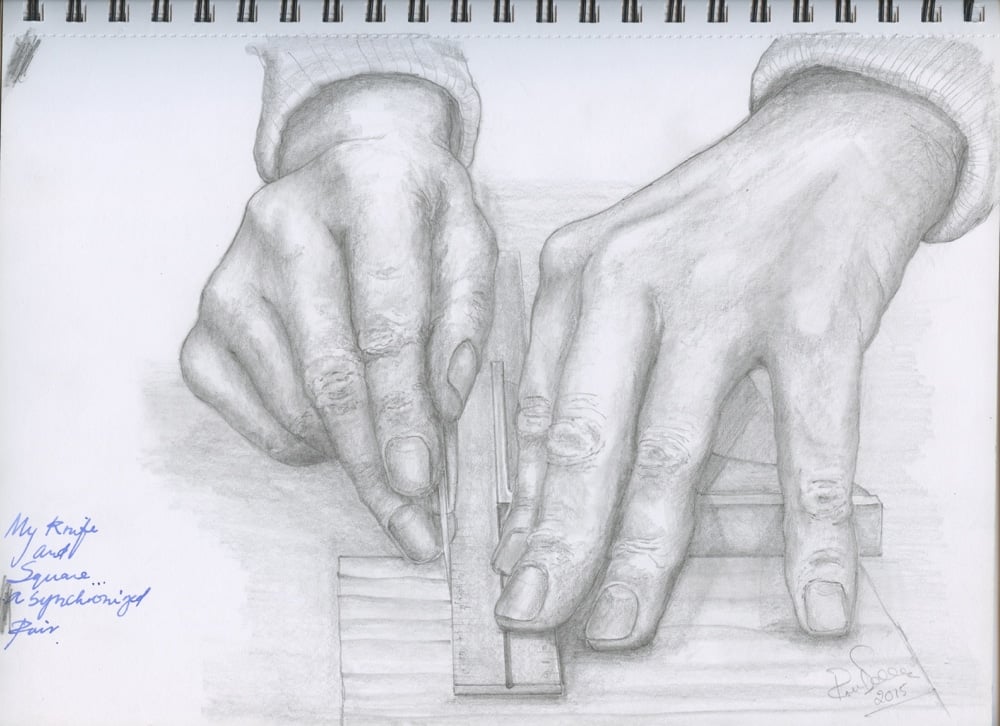
Every point of change is simply a stepping stone to something new. Learning your craft is an unfolding continuum into new future. To see it as less is to stunt your growth and side step your personal upskilingl. Whereas I am grateful for the dedicated years where without financial pressures, developing extraneous relationships, I could begin to own my craft. My apprenticeship seemed to me to be more the equivalent of my learning to read and write in school. Writing sentences comprised basic grammar, learning to spell and understanding that it was, like talking, a basic form of communication. At the end of my formal education, being programmed to make sense in structured sentences, I see now that it mostly provided a skeleton—a framework upon which to add flesh in the form of muscle and sinew—substance that conveyed meaning to others. I’m not at all a writer. I am a woodworker. My apprenticeship was merely the skeleton. The punctuation of interconnecting junctures where change of direction comes in sentences and paragraphs. It was only after my apprenticeship, knowing the sizes of components and the stability of different woods, understanding wood and tools and the union of will and problem that my life as a craftsman became the culture I could truly immerse myself in. Just as I faced the issues of structuring sentences to communicate, I found myself communicating my inmost feelings for woodworking and craft work as a whole through what I would make. It was here that I found myself moving readily and openly into an ever unfolding future.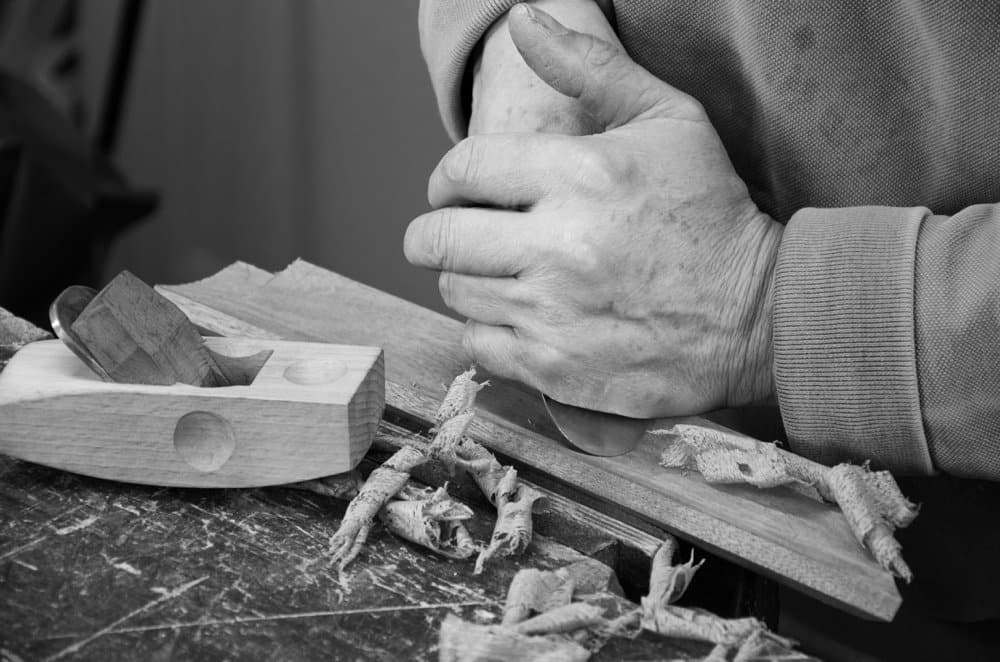
In woodworking I discovered the sciences. Biology made great sense to me in the photosynthesis in a leaf, the porosity of certain wood types over others. Things like that. I discovered mathematics and physics in leverage for lifting and shifting pressures, transferring energies, controlling direction. What made no sense to me in school made great sense in work. In woodworking geometry became fascinating as did private lessons with George at the bench after every question I asked.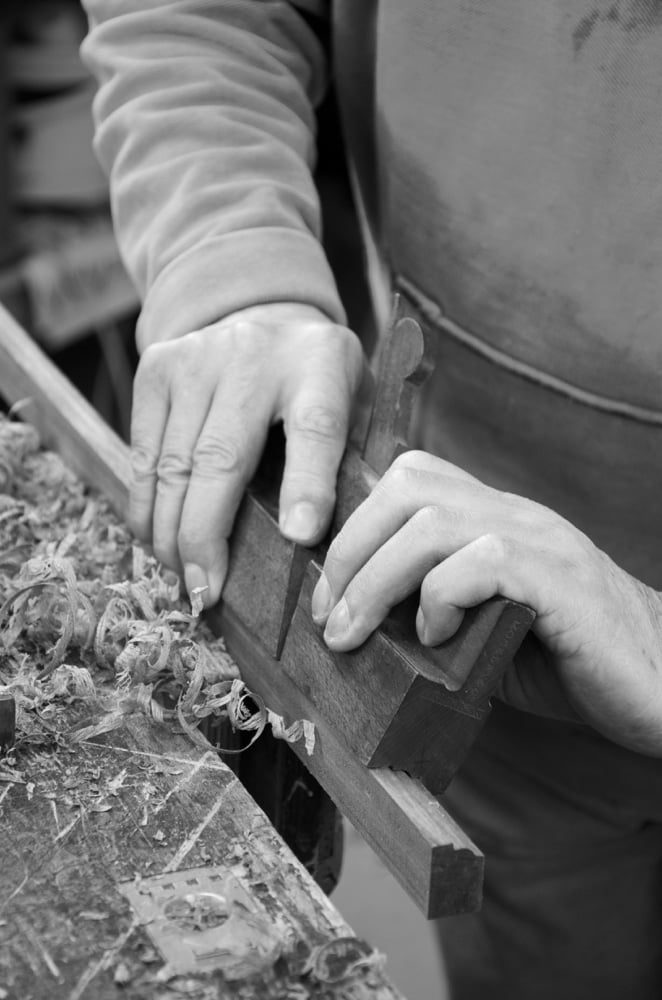
In the beginning I found the pen awkward to hold. Dipping the nib into the inkwell seemed always to overload the internal reservoir of the nib and that always resulted in what was called an ink blob. The Bic biro came into being but of course it was an inexpressive substitute resulting in the kind of standardisation schools seemed to love. Despite my intermittent ink blobs, my dip pen gave me the ability to express my inmost feelings. I rediscovered the fountain pen 30 years ago and never looked back. I shook of power equipment when I decided never to mass make again. It took some dismantling because OI had lost the exercise hand work demands. After three years or so all of my understanding of why I loved woodworking returned to me and I fell back in love with my opening experience of woodworking. In a sense I found my first love of woodworking still waiting for me. This was to understand the significant purpose of exactly what vocational calling was. It wasn’t at all where you sent the thick kids who couldn’t maker it in a more academic clime, it was where any kid could actually determine what they really wanted to achieve in their lifetime. Crossing that line enabled me to never work for money again. Money was the insignificant ingredient and not at all the driving force behind my work. I never worked to develop an idea to make me rich again. I never became rich in money, I became rich in relationships in a growing world of likeminded people, not just woodworkers, who wanted to become significantly skilled. Every video we have ever made comes with maximum forethought. What is best for my audience. What can I give that will make them grow, experiment, investigate, search and seek what has in fact been lost to the age of technology that seems always to be the resource people turn to for answers.
Many things that I make hide the reality of my struggles. Most people never see the work it takes, sometimes the agony, the self examination, the inner battles. Have I hit the mark. The last thing I want is to pad things out. The last thing I want is to hide anything. You know, speed up a process by using tablesaws and routers, such like that. The last thing I want is sponsorship by some giants. The last thing I want is to compromise my work and my freedom to be forthright. Manufacturers want me to use their hand tools, but the ones you see me use in the videos are the ones I bought from somewhere. High end ones too. I’m researching bandsaw blades at the moment. I buy them. The makers offer them for free. Hundreds of pounds worth, but I buy them. Hand tools I usually buy anonymously. Not always but I always because the sellers may know me, but I always buy at full price. I never feel compromised this way. I stopped writing for the magazines for the same reason. An editor of a magazine once said to me, “No, we don’t want a full article from you, we want short sections of an article in pieces so that people keep coming back.” I never wrote another magazine article. I started blogging instead.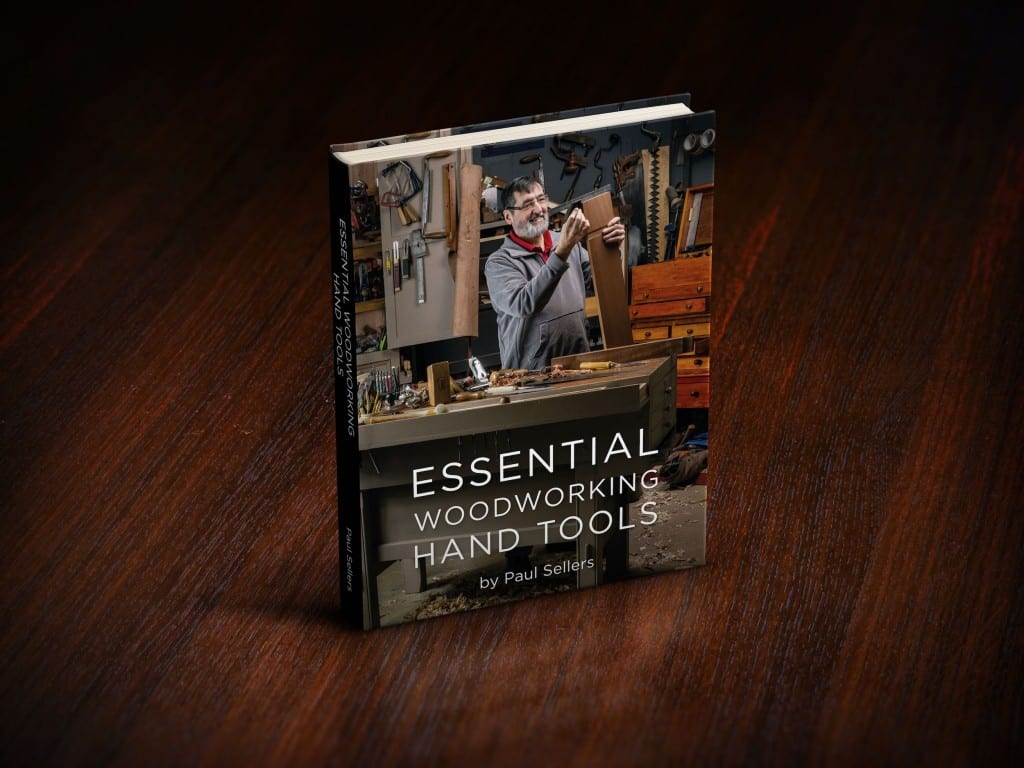
So between blogging and writing my books, making our own videos instead of for others, I live my life in the style I have engineered with the help of several others who support my work. It’s a freedom to life an expressive woodworking lifestyle. The shelves that hold my tools and things are real. Nothing is placed for effect, nothing decorative or designed to lure or tease. This is my life.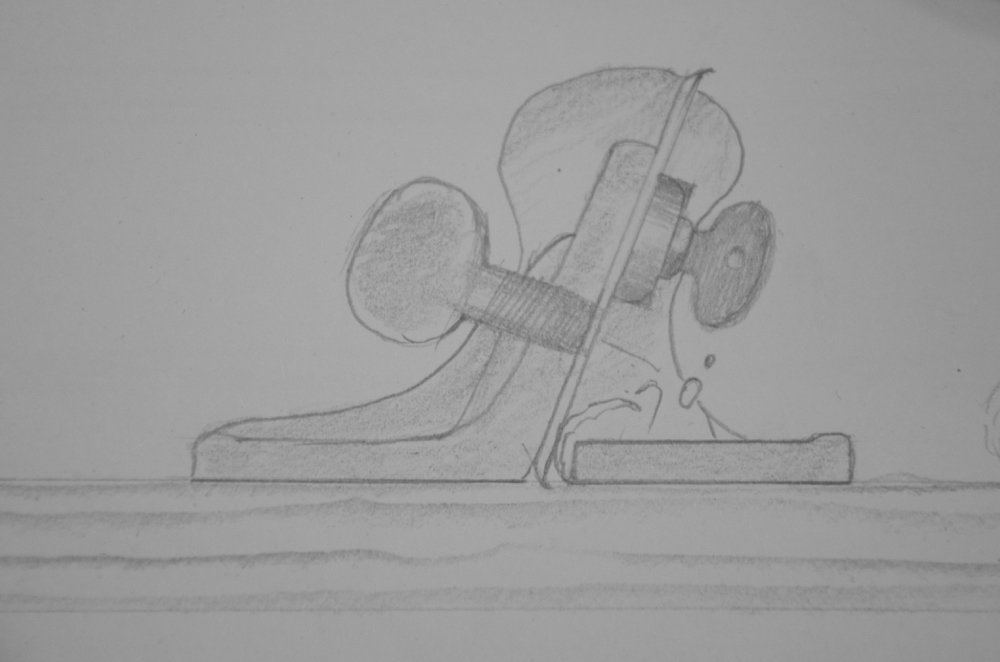
I have more to write of my life under George. I do this because it undergirds my early beginnings. It’s the foundation of me as a woodworking craftsman. Where it ends I will not know yet. Perhaps I never will until the very end.


Hi Paul,
is there an autobiography coming?
One day perhaps, but these are not it.
I would be interested in one. I find your life stories and just your overall personality very interesting.
As they say in Texas: “The road goes on forever and the party never ends.” One man digs himself into the life of a slave and another makes the same work artistry. Just here to enjoy the party.
Paul you say you are not a writer, but yet your words flow like water. Paul your woodworking teaches us, your words warm us, they lets enjoy the past life you had as a young man. What endured, what you liked, disliked, what you enjoyed and what you hated. While reading your words I feel like am there working George, and others you speak about. As you write about feeling the plane slice through the wood hearing the sound, smelling the fresh cut wood we are all there which you. To me that is a true writer. When I close my eyes and can see all that you discribe and sense my hands are traveling down the piece of wood, you have achieved your goal.
Paul while you are a great woodworker, you have also achieved the level in life of being a great Writer as well.
Thank you for all you do for us, while we can not see all the issues you and your team go through to bring us the videos, blogs and other great content you all provide us, please know this we do appreciate all that you all do.
RichG
What RichG said. Your words flow like water….. Couldn’t have said it better myself. I find you and your life in credibly intriguing and of course, I’ve never met you. Thanks for all you do for us. It doesn’t go un-noticed.
Daniel
A small point of disagreement,Paul. Yes, you are a writer. When the words you write create a world that we can see and learn, it is good writing. When we are transported to a different place and time,can smell the wood fragrance and hear the tools at work, it is good writing. Thank you for your sharing and teaching.
All very nice Paul but there you go again wetting my appetite with an ovolo moulding plane…….if you were making a sash bar how would you cut the rebate without a sticking board. I see shavings covering the depth of stock held in your vice…..how would you hold thinner stock in a vice? Without the plane striking jaws of vice.
All said with a non judgemental intent…..just a hope that you might relent and show us sticking boards …moulding planes and even a scratch tool??
Regards John2v
I would love that too, been hoping for years that he might.
I wish all professors (mine and my children’s) would read this post. I wondered for so many years why I needed to learn all this advanced maths; I didn’t actually understand a thing at the time I was taught; merely memorized enough for a passing grade.
Much later, I ended up learning them all over again, when I started to wonder why my house wasn’t heating evenly, and all the so-called specialists told me to just install an even bigger furnace.
I admire your dedication in advocating the necessity of thoughtfulness and a sense of purpose. Hope many will follow your example too.
Thank you, Paul.
This came at a perfect time for me- I was thinking while watching the videos on the bench drawer the that a not to be named saw maker you were using had got to you and you were showcasing it. Yes, I did think this, without guile mind you, just that everyone has to make a dime. But, alas Paul you regained my faith that some of us actually do our work for the love of the work and the completed task, rather than the lucre that is beholding many to their tasks.
Paul,
Kindly do more drawings such as the scraper cross-section (Stanley 85, I believe?). Such a simple drawing showing so much detail, is missing today, even by manufacturers of copies of vintage tools. Many of us discover, through much trial and error, what is shown in that simple picture.
T.Z.
Hello Paul,
This is my first comment here, but I wanted to say that I completely agree with RichG’s comment and Daniel’s right below his. What I really find invaluable about your words is that you are like I am, but then again not, since I spent over 17 years as a cabinet maker in the US, where woodworking apprenticeships did not (and-other than at the college level-do not) exist. But your words are from the perspective of someone who has struggled in your woodworking in order to make a living, and (oh by the way) fell in love with it in the meantime. I say that I spent 17+ years working in cabinet shops, but I never stopped woodworking (only got sick of poverty, so decided to go to university–the biggest mistake I ever made) though I never was lucky enough to find a George in my life. But I did have an Arnold and a bit later a Charles, both of whom were able to teach me the fundamentals–and later the finer points–of machine woodworking (which is the only sort that exists here in the USA, at least on the professional level). Because of various circumstances in my life (I was recently put on disability so am in danger of spending my life twiddling my thumbs) I have decided to devote my life to teaching the willing people in my area to do whatever woodworking they are capable of, and using (I think, though I will still need to work out the details) your books and videos as a guide in my teaching, once I’ve acquired the skills necessary in my own semi-unskilled hands. So far, I’ve been successful in this pursuit, at least judging from the feedback of the students, but I do have a long way to go, and I suppose that was the entire point of your blog; to not give up and keep moving forward, so I guess it was ‘lucky’ for me that apprenticeships were never instituted in the USA, because there is an entire world of moving ahead open both for me and my students.
Dave A.
Excellent article, I find as I move through my fifties that the values you illuminated, resonate more each day with me.
Thank you
James L.
A true teachers instructs and explains the why of things. Not shove a formula down your throat and tell you that’s the way it is and walks away. Today schools are manufacturing facilities. They push out cogs in the machine. Cheaply made, easily replaced. A true craftsmen and artists have a true understanding of their subjects. By that I mean that the great artists of the past had as great an understanding of the human anatomy for example as any great surgeon of today.
You teach. You don’t just give a number of regimented instructions and walk away. For that alone I’ll be forever grateful. Thank you.
Israel
Paul you say you are not a writer but you prove otherwise. You are a poet and a Philosopher using woodworking as a metaphor. I truly enjoy your work and I know I am not alone.
I look forward to all your new posts and videos.
Thank you for your great contribution to society.
Best regards.
Fibonacci for fun, Golden Ratio for aesthetics, Pythagoras for square angles, Archimedes for levers, Euclides for geometry and perspective. Mathematics is the language of nature and the world around us, hence also (a part of) the language of woodworking.
Skilled hands with the right tools can create Cosmos out of Chaos.
And whenever my less-skilled hands produce a curved sawline, I comfort myself by recalling that Euclides’ fifth (parallel) postulate was just that… a postulate…. and that my handywork conforms perfectly to non-Euclidean geometry. One just has to dare to think outside of the box. Or trapezium, if one’s square is less than square.
I’ve been working wood with the old approach and trial and error is a blessed and yet cruel judge. Not rarely the thought “how Paul Sellers makes it look so simple” haunted me, and I started realizing that my logic was deceiving me by taking from granted what other people was capable manually. Separating manual labour from intellectual is very hard. Hand tools are a very difficult path to go by oneself, but most rewarding too. Ripping, planning, getting things right takes a lot of effort and, although I’d not list my achievements in a portfolio, I’m very proud of them due to the amount my body work.
You are making your life extraordinary in its normalcy.
I admire you a lot for the position that you have taken against the market.
You are an example to follow not only for woodworking.
Gianluca (from south of Italy)